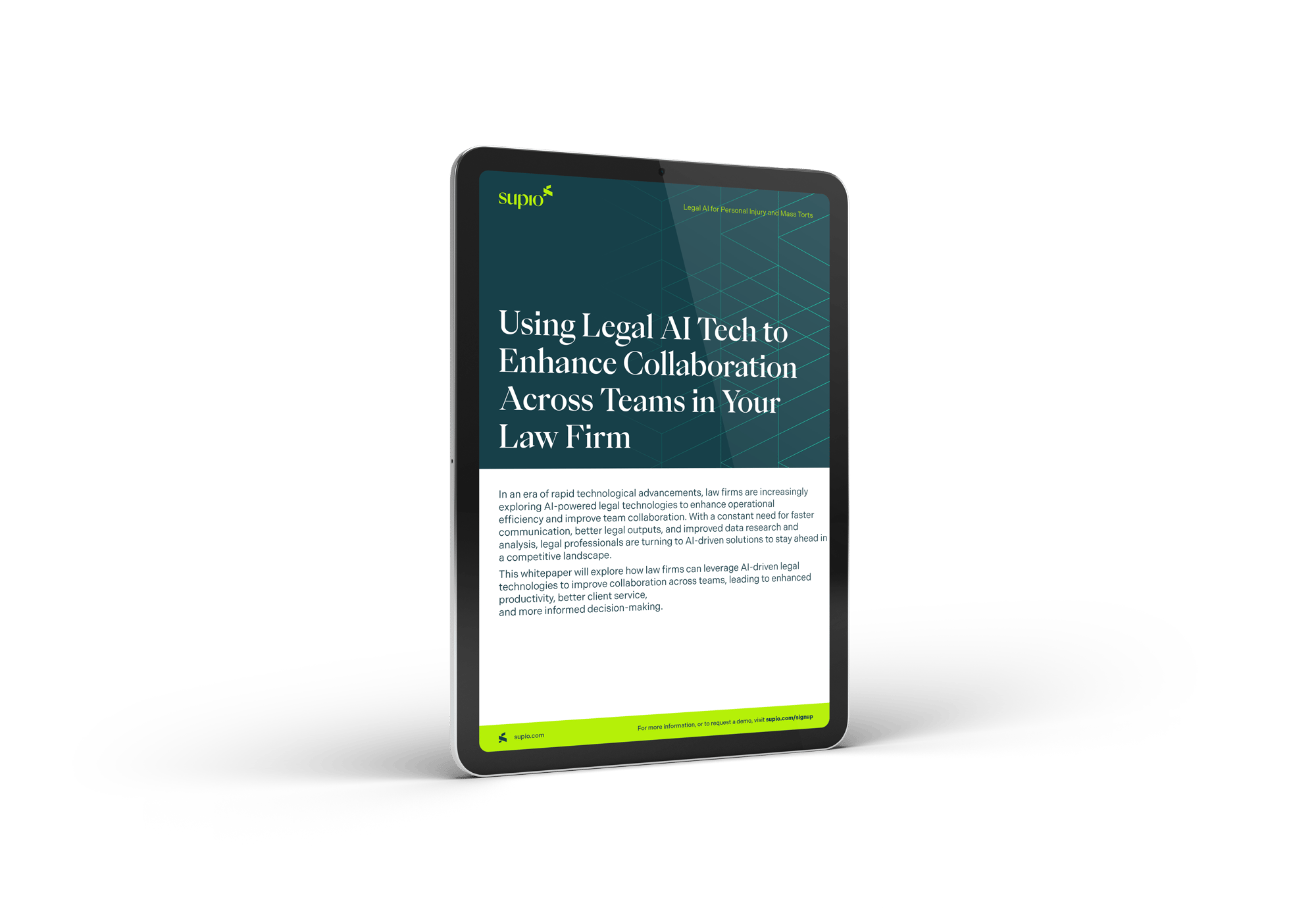
Using AI to Enhance Collaboration in your Law Firm
In an era of rapid technological advancements, law firms are increasingly exploring Al-powered legal technologies to enhance operational efficiency and improve team collaboration. With a constant need for faster communication, better legal outputs, and improved data research and analysis, legal professionals are turning to Al-driven solutions to stay ahead in a competitive landscape.
This whitepaper will explore how law firms can leverage Al-driven legal technologies to improve collaboration across teams, leading to enhanced productivity, better client service, and more informed decision-making.
The Evolution of Legal Technology
Historically, law firms have relied on manual processes to handle case management, client communication, and document review. As the volume of data grows exponentially, the need for more sophisticated tools has become apparent. Legal Al tech-Al software and platforms designed specifically for the legal industry-has evolved to address these challenges, with Al emerging as a transformative force.
Al-powered legal tech now offers capabilities such as:
- Ability to interact with your data and documents with tools like an interactive Al chatbot to uncover critical insights previously missed by the human eye
- Ability to analyze and organize complex, unstructured data like medical records.
- Ability to get legal outputs like medical chronologies that are categorized, filterable, searchable, and summarized with direct links to where information is found.
- Ability to quickly & easily manage tedious tasks like organizing medical billing and matching corresponding medical records.
- Ability to prepare for litigation with a deep dive analysis into depositions, witness testimonies, or expert reports where you can easily uncover contradictions or similarities that can impact your case.
- For motor-vehicle accidents, you can get perfected demand letters at human-like accuracy with highlighted discrepancies, pre-built exhibits, calculated damages and liabilities.
- For mass tort cases, you can get plaintiff fact sheets and quick summaries to easily highlight when or where you have a case (or if you should walk away from a case) While these innovations have improved productivity, law firms are now focusing on using these tools to foster collaboration across departments and teams.
The Importance of Collaboration in Law Firms
Driving Seamless Communication
Effective collaboration is essential for law firms that deal with complex cases requiring input from multiple attorneys, departments, or even external parties. The ability to access and share information seamlessly is critical for delivering superior client service and maintaining competitiveness.
Challenges often include:
- Data silos: Teams working in isolation, leading to duplicated efforts and fragmented client communication.
- Missed information: When 100s or 1000s of pages of documents are in consideration, it is easy for teams to miss critical insights that could make or break your case (or missed revenue opportunities)
- Inefficient workflows: Manual processes slow down case progress and decision-making.
- Communication barriers: Misaligned expectations and inconsistent communication methods can create delays or errors.
Al-enabled legal technologies can play a crucial role in overcoming these challenges by providing a platform for centralized collaboration, data analysis, research, and sharing.
How Legal Tech Enhances Collaboration
Centralized Case Insights
Al-driven legal tech platforms centralize case data and documentation, ensuring that team members can access the most up-to-date information in real-time or add new documents to a case when it is needed. This leads to enhanced collaboration between internal legal teams and the ability to share with external stakeholders like an insurance adjuster or your client, in real-time. By integrating Al, these efficiencies offer the ability to free up legal professionals to focus on higher-value activities.
Interacting with your Data
With the ability to interact with your data and documents, teams can work together faster.
When legal teams can uncover case critical insights within seconds (insights previously missed by the human eye), this can eliminate bottlenecks, optimize resource allocation, and ensure that collaboration happens efficiently across departments. And more importantly, legal teams can get back to their client faster and more frequently.
Al-powered chatbot tools can also uncover insights like gaps in treatment or missed diagnoses, so you can bring more value to your case. You can even ask it questions about weaknesses in your case or where opposing counsel may have arguments.
Enhanced Organizational Tools
Legal tech platforms that include Al-driven organization tools that can support elements of a case, like medical billing, help teams stay quickly and easily manage tedious tasks, whether they are working in the same office or across different locations. Having the ability to organize medical billing and quickly match bills to corresponding medical records (and get out of manual excel spreadsheets) save legal teams hours of work.
Collaborative Document Review and Drafting, at Human-Level Accuracy
In traditional law firms, document review often requires back-and-forth communication that can slow down progress. Al-driven platforms allow legal teams to get legal outputs at human-levels of accuracy. Al generated medical chronologies can be categorized, filterable, searchable, and summarized with direct links to where information is found. Al solutions like Supio, have legal outputs like demand letters that can be accessed and edited in real-time. This eliminates the need for manual reconciliation of edits and allows for faster approval processes.
Furthermore, Al tools for contract and document drafting can significantly reduce errors, flagging inconsistencies or missing documents before they become an issue.
Prepare teams for Litigation
Al designed to support the legal industry provide much needed insights to build case strategies and prepare, when or if needed, litigation support. Legal teams can upload multiple records or reports, like expert reports in a complex medical issue and compare similarities or find contradictions. Lawyers can better prep their client by uncovering weaknesses in their case or areas that the opposing counsel may argue. If you have a client who said one thing in a deposition, but it varied in the initial police report from an accident, you can be prepared to address it in court.
Al solutions like Supio offer so much accuracy and reliability with direct links to where information is found in case records that lawyers have even used Supio in court.
Choosing the Right Legal AI Tech for your Law Firm
As law firms evaluate Al solutions, several key factors must be considered to ensure they choose the best technology for their firm:
Accuracy and Reliability
The right Al will provide you with the confidence that the information and insights they deliver for your cases is accurate and you can trust it so much, in fact, that you can use it in court.
The right Al will have all your case information contained in its own environment and will have minimal hallucinations. You will know it is accurate when and if the insights delivered tell you where the information is pulling from. Supio's Al is 100% tested and quality assured by humans to ensure the outputs delivered to your portal are accurate and reliable.
HIPAA Compliance and Security
Your client's data is too important to chance on the wrong individuals having access or seeing it. Ensure you work with an Al that is HIPAA compliant and has security measures in place to ensure your client's data is secure. Supio is HIPAA compliant and has a security company, Vanta, monitoring all data coming in and out of Supio to ensure your client's data is secure.
Integrations
The right Al will be integrated with the tech stack you are already using. Supio is currently integrated with the major legal case management solutions and also has secure portals to provide access to upload case documents for those without a case management system.
Conclusion
Al-driven legal tech solutions have the potential to revolutionize how law firms collaborate internally and externally. By enhancing ability to communicate quicker, get better legal outputs, and improve data research and analysis, law firms can operate more efficiently, deliver superior client outcomes, and remain competitive in an ever-evolving legal landscape.
As you evaluate Al-powered options for your firm, prioritize solutions that not only address your current needs but also empower your teams to collaborate more effectively, ensuring long-term success and growth.

